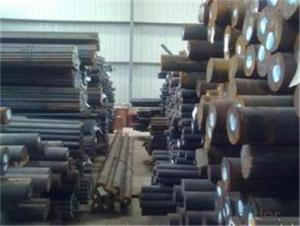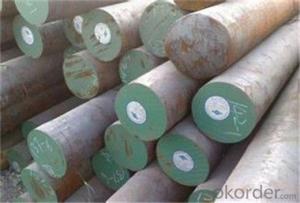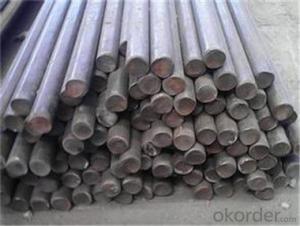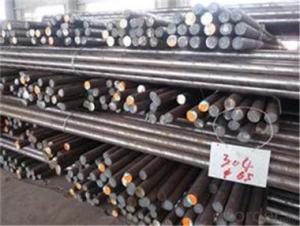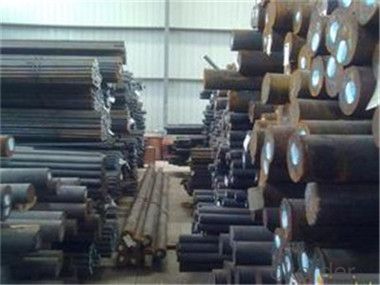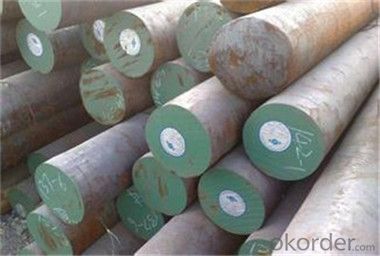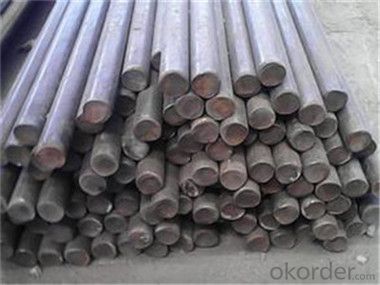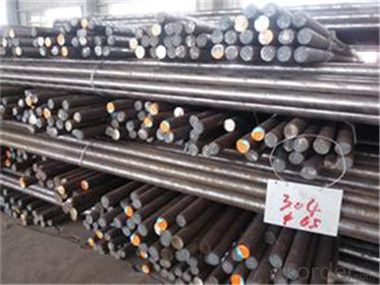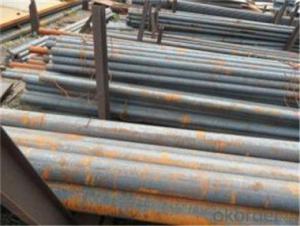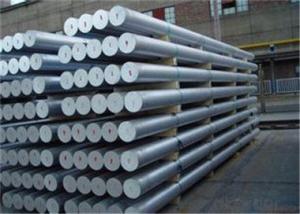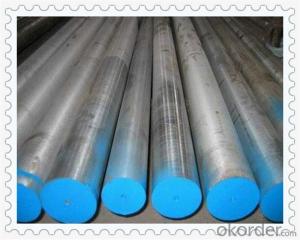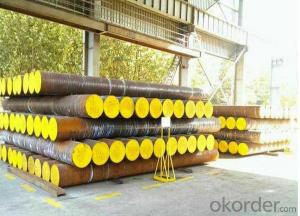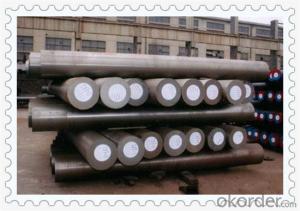42CrMO SCM440 Forged or Hot Rolled Sae 4140 Steel Round Bars
- Loading Port:
- Tianjin
- Payment Terms:
- TT OR LC
- Min Order Qty:
- 70 m.t.
- Supply Capability:
- 2000000 m.t./month
OKorder Service Pledge
OKorder Financial Service
You Might Also Like
Description of steel round bar:
Mild Steel Round Bar is used for making security grills, screens, Construction and Machine Manufacture.Stainless steel bar is widely used in Architecture,Machine Manufacture,Power Station,Electric Equipment and Factory,Oil and Chemical Industry,Food and Medical Industry,City Decoration Industry
Festures of steel round bar:
Length: standard 6m,9m,12m, or as customers' requirement
Surface: Black, polished, grinded, ,Bright, Turn smooth(Peeled),Brush,Mill,Pickled
Process:Hot rolled,cold drawn,forged
Packing: In bundle, tied by steel straps, covered with protecting film
Use wooden box, fill with foam to keep the surface from damaging
Specifications of steel round bar:
Description : Steel Bar/Stainless Steel Round Bar/Alloy Steel Round Bar/Carbon Steel Bar
Stainless Steel Bright Bar/Stainless Steel Peeled Bar/Stainless Steel Polishing Bar
Diamater:
1 Hot rolled round bar diameter from 5.5mm to 110mm
2.Hot forged round bar diameter from 110mm to 400mm
3.Cold drawn round bar diameter from 2.0mm to 60mm
4.Grinding bar diameter from 4.0mm to 40mm
5.Turn smooth diameter from 40mm to 250mm
Images of steel round bar:
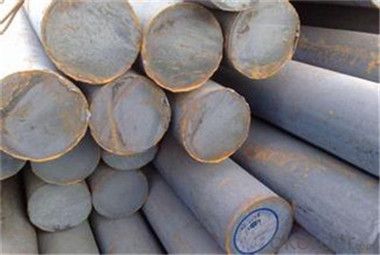
FAQ:
1. What is your main market?
We mainly export to Asia such as Japan,Korea,Thailand and North America and Middle East.
2. How long is the lead time?
Delivery time: 45 days after order confirmed.
3. What payment term do you accept?
Payment: T/T or L/C at sight.
4.Why do you choose to cooperate with us?
We have over10 years experience in this business so we are able to provide you the high quality products with the best price.
- Q: How do I choose the right grade of steel round bar for my application?
- To select the appropriate grade of steel round bar for your needs, it is crucial to carefully consider various factors. Here are some guidelines to assist you in making an educated decision: 1. Begin by understanding the specific requirements of your application. Take into account factors like load-bearing capacity, resistance to corrosion, temperature endurance, and any applicable industry regulations or standards. 2. Determine the mechanical properties necessary for your application. Depending on the specific use, you may require certain properties such as strength, hardness, toughness, or ductility. Prioritize these properties based on their significance to your application. 3. Assess the environmental conditions in which the steel round bar will be used. This includes factors like exposure to moisture, chemicals, high temperatures, or abrasive surroundings. Certain grades of steel offer better resistance to corrosion or heat, rendering them more suitable for specific conditions. 4. Seek guidance from experts if you are uncertain about the most suitable grade of steel for your application. Consult metallurgists, engineers, or suppliers who can provide valuable insights based on their expertise and experience. 5. Compare and contrast different grades of steel round bars available in the market once you have a clear understanding of your application requirements. Consider factors such as composition, manufacturing process, and specific properties associated with each grade. Look for grades that closely align with your requirements. 6. Review the industry standards and specifications to determine if any specific grades are mandated for your application. These standards can offer guidance and ensure compliance with safety and quality requirements. 7. Evaluate the cost-effectiveness of various grades by considering factors like initial purchase cost, maintenance and replacement expenses, and the overall lifespan of the steel round bar. 8. If possible, conduct tests or trials using different grades of steel round bars to assess their performance in your specific application. This will provide valuable data to aid your decision-making process. By following these steps and taking all relevant factors into account, you can efficiently and effectively select the appropriate grade of steel round bar that meets the demands of your application.
- Q: What is the carbon content in steel round bars?
- The carbon content in steel round bars typically ranges from 0.15% to 0.60% depending on the grade and specific requirements.
- Q: How are steel round bars used in the construction of dams and reservoirs?
- Due to their strength, durability, and versatility, steel round bars are essential components in the construction of dams and reservoirs. These bars, typically made of reinforced steel, play a vital role in reinforcing the concrete structures that make up dams and reservoirs. In dam construction, steel round bars are primarily used as reinforcement in concrete walls and foundations. Strategically placed within the concrete, these bars provide additional tensile strength, preventing cracking and ensuring the structural integrity of the dam. By withstanding the enormous pressure exerted by the water, the reinforcement helps prevent leaks or potential failures. Furthermore, steel round bars are utilized to strengthen the spillway gates and control structures of dams and reservoirs. These gates regulate the flow of water and prevent overflow during heavy rains or floods. By reinforcing these critical areas with steel round bars, engineers guarantee that the gates can endure the forces exerted by the flowing water, maintaining their functionality and preventing potential damage. In addition, steel round bars are used in the construction of penstocks, which are large pipes or conduits that transport water from reservoirs to turbines in hydroelectric power plants. These bars reinforce the penstocks, ensuring they can withstand the high pressure of the water as it flows through and powers the turbines. In conclusion, steel round bars are extensively applied in dam and reservoir construction to enhance the strength and durability of various structural components. Their ability to reinforce concrete walls, foundations, spillway gates, control structures, and penstocks makes them indispensable in ensuring the longevity and stability of these crucial water infrastructures.
- Q: Are steel round bars suitable for decorative purposes?
- Yes, steel round bars can be suitable for decorative purposes. Steel is a versatile and durable material that can be shaped and manipulated into various designs and patterns. Steel round bars can be used to create decorative elements such as railings, furniture, sculptures, and architectural details. The smooth and shiny surface of steel can add a modern and sleek aesthetic to any space. Additionally, steel is known for its strength and longevity, making it a practical choice for decorative purposes as it can withstand environmental factors and maintain its appearance over time.
- Q: What are the advantages of using nickel-molybdenum alloy steel round bars?
- There are several advantages of using nickel-molybdenum alloy steel round bars: 1. High strength and durability: Nickel-molybdenum alloy steel round bars have excellent strength and durability properties, making them suitable for use in high-stress applications. They can withstand heavy loads and provide long-lasting performance. 2. Corrosion resistance: The addition of nickel in the alloy enhances its corrosion resistance, making it resistant to various corrosive environments. This makes nickel-molybdenum alloy steel round bars ideal for use in industries where exposure to chemicals or moisture is common, such as the oil and gas industry or marine applications. 3. High temperature resistance: Nickel-molybdenum alloy steel round bars exhibit excellent heat resistance properties, allowing them to maintain their mechanical strength and structural integrity at high temperatures. This makes them suitable for use in applications where elevated temperatures are present, such as heat exchangers or power generation equipment. 4. Excellent machinability: Nickel-molybdenum alloy steel round bars can be easily machined and fabricated, allowing for various customization options. This makes them versatile and easily adaptable to different project requirements. 5. Weldability: These alloy steel round bars have good weldability, which means they can be easily joined to other components or structures using standard welding techniques. This makes them convenient for manufacturing processes and construction projects. 6. Cost-effective: Despite their excellent properties, nickel-molybdenum alloy steel round bars are relatively cost-effective compared to other high-performance alloys. This makes them a cost-efficient choice for various applications, providing value for money without compromising on quality. Overall, the advantages of using nickel-molybdenum alloy steel round bars include high strength, corrosion resistance, temperature resistance, machinability, weldability, and cost-effectiveness. These properties make them a preferred choice for various industries and applications where superior performance and durability are required.
- Q: What are the different packaging options for steel round bars?
- Customers have various packaging options to choose from when it comes to steel round bars, depending on their specific needs and requirements. Some commonly used packaging options include: 1. Bundles: Steel round bars can be bundled together using steel straps or wire to create a compact and secure package. The bundles come in different sizes, ranging from 2 to 5 tons, and are suitable for transportation and storage purposes. 2. Wooden Crates: For enhanced protection during transportation, steel round bars can be packed in wooden crates. These crates are designed to withstand the weight and size of the bars, ensuring safe delivery to the customer. 3. Steel Cages: In certain situations, steel round bars are packaged in steel cages or racks to provide additional stability and security during transportation. These cages are typically made of sturdy steel and can be stacked, making them suitable for storage as well. 4. Plastic Wrapping: To safeguard the steel round bars from moisture, dust, and other contaminants, they can be wrapped in plastic or shrink wrap. This packaging option is commonly used when the bars are stored or transported in open-air environments. 5. Customized Packaging: Depending on the customer's specific requirements, steel round bars can be packaged in custom-designed containers or crates. These can be tailored to accommodate different sizes, weights, and quantities of bars, ensuring maximum convenience and safety during handling and transportation. It is important to note that the choice of packaging option may vary based on factors such as the destination, mode of transportation, and specific industry standards. Therefore, customers are advised to consult their suppliers or packaging experts to determine the most suitable packaging option for their steel round bars.
- Q: What is the difference between a turned and a polished steel round bar?
- A turned steel round bar and a polished steel round bar both undergo separate processes that result in different surface finishes and properties. A turned steel round bar is typically created by using a lathe machine to remove material from the surface of a steel bar. This process involves rotating the bar against a cutting tool, which cuts away the outer layer and leaves behind a smooth and cylindrical surface. The turned bar may have visible machining marks due to the cutting process, although it is generally considered to have a more precise and uniform diameter compared to other types of steel bars. Turned bars are often used in applications where dimensional accuracy is crucial, such as in machinery or tooling. On the other hand, a polished steel round bar undergoes a different process that involves grinding or buffing the surface to achieve a smooth and reflective finish. Polishing removes any imperfections or roughness from the surface of the steel bar, resulting in a highly lustrous appearance. Polished bars are often used in decorative applications or where visual aesthetics are important, such as in architectural designs or high-end consumer products. In summary, the main difference between a turned and a polished steel round bar lies in their respective manufacturing processes and resulting surface finishes. A turned bar is machined to achieve precise dimensions, while a polished bar is subjected to a polishing process to obtain a smooth and reflective surface. The choice between the two depends on the specific requirements of the application, with turned bars being preferred for dimensional accuracy and polished bars for aesthetic appeal.
- Q: What are the different surface finishes available for steel round bars?
- Steel round bars can be finished in various ways, each with its unique properties and applications. Some commonly used surface finishes include: 1. Hot Rolled: By heating the steel above its recrystallization temperature and allowing it to cool, a rough and scaled surface is achieved. This finish is suitable for applications that prioritize functionality over aesthetics. 2. Cold Drawn: The steel round bar is pulled through a die at room temperature, resulting in a smooth and polished surface. This finish offers improved dimensional accuracy and tight tolerances, making it ideal for precise applications that require a visually appealing appearance. 3. Turned and Polished: Using a lathe machine, the steel round bar is turned to achieve a smooth and shiny surface. This process eliminates any imperfections and irregularities, providing a close tolerance and highly finished surface. Turned and polished bars are commonly used in applications that demand high surface finish and dimensional accuracy, such as shafts and precision components. 4. Ground: Grinding is employed to remove surface defects and irregularities, resulting in a highly accurate and smooth surface finish. This finish is suitable for applications that require close tolerances and a superior surface finish, such as bearings, gears, and high-precision components. 5. Coated: Steel round bars can be coated with materials like zinc, chrome, or nickel to enhance their performance and protect against corrosion. Coated bars offer improved durability, corrosion resistance, and aesthetic appeal. The choice of surface finish for steel round bars depends on specific application requirements, including dimensional accuracy, surface quality, corrosion resistance, and aesthetic appeal.
- Q: How do you calculate the fatigue strength of a steel round bar?
- Various methods can be employed to calculate the fatigue strength of a steel round bar. For instance, the stress-life (S-N) curve approach or the strain-life (ε-N) curve approach can be utilized. The stress-life (S-N) curve approach entails plotting the stress amplitude (S) against the number of cycles to failure (N) on a log-log scale. By subjecting multiple specimens of the steel round bar to different stress levels and measuring the number of cycles to failure for each stress level, the S-N curve can be obtained. The fatigue strength of the steel round bar can then be determined by identifying the stress level at which the desired number of cycles to failure is achieved, commonly known as the endurance limit. On the other hand, the strain-life (ε-N) curve approach involves plotting the strain amplitude (ε) against the number of cycles to failure (N) on a log-log scale. Similar to the S-N curve approach, multiple specimens of the steel round bar are subjected to different strain levels, and the number of cycles to failure is recorded. By utilizing the strain-life curve, the fatigue strength can be determined by identifying the strain level corresponding to the desired number of cycles to failure. It should be emphasized that calculating the fatigue strength of a steel round bar necessitates conducting fatigue tests on representative specimens under controlled conditions. These tests involve subjecting the specimens to cyclic loading, typically in the form of tension-compression cycles, and recording the number of cycles to failure. The data obtained from these tests is then utilized to construct the S-N curve or the ε-N curve, which offers valuable insights into the fatigue behavior and strength of the steel round bar.
- Q: What are the advantages of using molybdenum-alloy steel round bars?
- There are several advantages of using molybdenum-alloy steel round bars in various applications. Firstly, molybdenum enhances the strength and hardness of the steel, making it an ideal choice for industries that require high strength materials. The addition of molybdenum improves the resistance to deformation under heavy loads, making the round bars more durable and long-lasting. Secondly, molybdenum-alloy steel round bars have excellent heat resistance properties. This makes them suitable for applications that involve high temperatures, such as in the manufacturing of heat exchangers, boilers, and furnace components. The steel's ability to withstand extreme temperatures without losing its strength and structural integrity is a significant advantage. Another advantage is the corrosion resistance provided by molybdenum. Molybdenum-alloy steel round bars exhibit superior resistance to corrosion in various environments, including acidic and alkaline conditions. This makes them an ideal choice for applications in corrosive industries such as chemical processing, oil and gas, and marine environments. Furthermore, molybdenum-alloy steel round bars offer excellent weldability and machinability. The molybdenum content ensures that the steel maintains its structural integrity during welding and machining processes, minimizing the risk of cracks or deformations. This ease of fabrication allows for greater flexibility in design and construction. In addition to these advantages, molybdenum-alloy steel round bars also offer good wear resistance, making them suitable for applications that involve abrasive conditions. Their ability to withstand wear and tear ensures a longer service life, reducing maintenance and replacement costs. Overall, the advantages of using molybdenum-alloy steel round bars include increased strength, heat resistance, corrosion resistance, weldability, machinability, and wear resistance. These properties make them a preferred choice in various industries where durability, reliability, and performance are essential.
Send your message to us
42CrMO SCM440 Forged or Hot Rolled Sae 4140 Steel Round Bars
- Loading Port:
- Tianjin
- Payment Terms:
- TT OR LC
- Min Order Qty:
- 70 m.t.
- Supply Capability:
- 2000000 m.t./month
OKorder Service Pledge
OKorder Financial Service
Similar products
Hot products
Hot Searches
Related keywords
